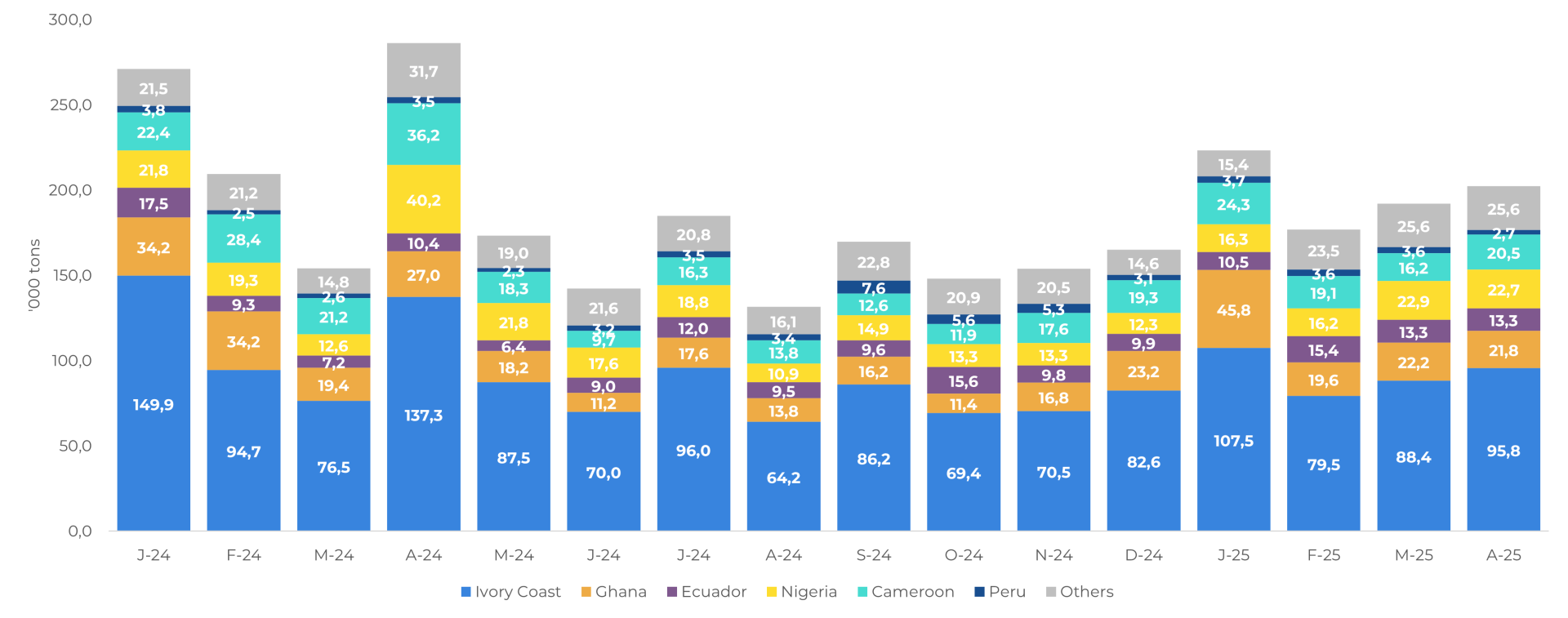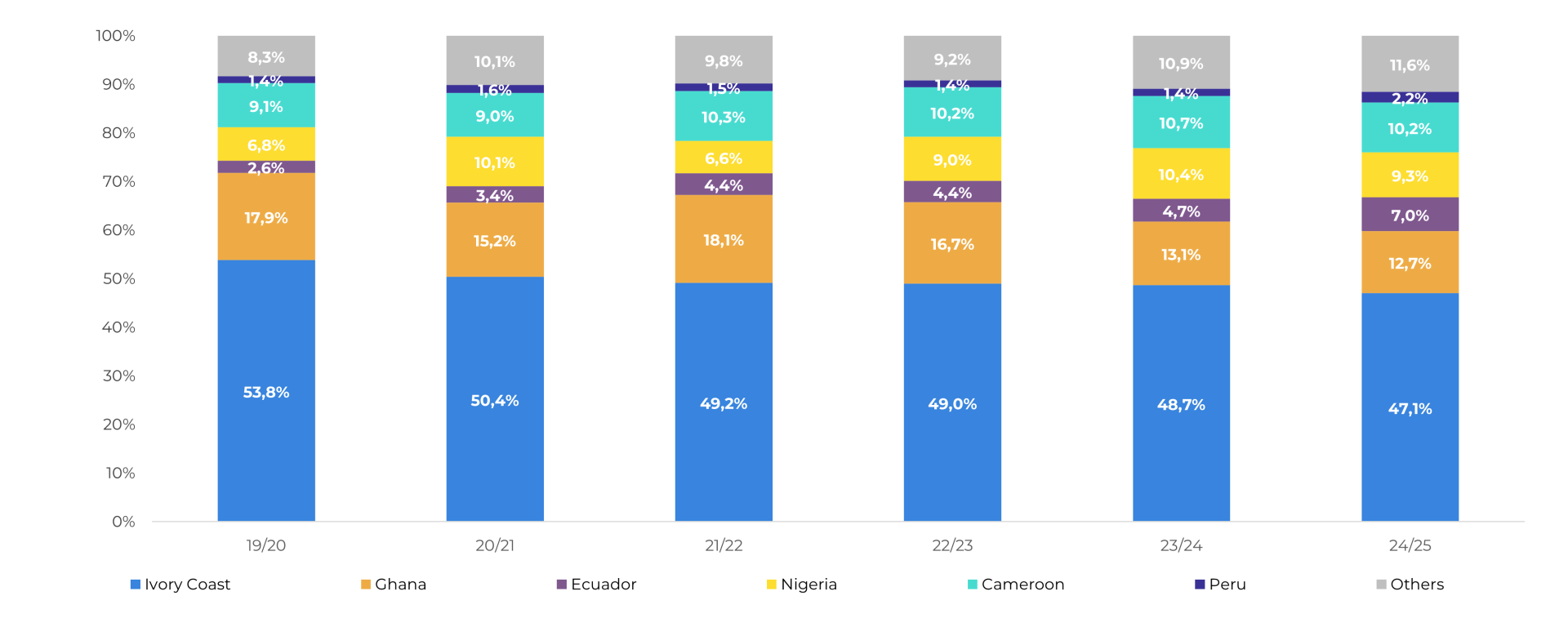
An Analysis of European Union Cocoa Imports
- European Union cocoa imports decreased in early 2025. The restricted supply of cocoa in recent years, low stocks, and the rising cost of beans and their by-products may have contributed to the decline in the bloc’s imports.
- In the medium to long term, this performance reinforces concerns about the bearish trend in cocoa demand.
- Assessing European Union cocoa imports by origin, Ivory Coast and Ghana account for more than 50% of the total volume imported in recent periods.
- In this context, another important point to be evaluated regarding these cocoa origins is EUDR, which requires proof through mapping that products such as cocoa came from areas not deforested after 2020.
- A study conducted by some organizations, including the World Cocoa Foundation, assessed the quality and performance of maps with local and global data for regions in the Ivory Coast and Ghana and concluded that challenges remain.
- Finally, the increase in the share of other origins such as Ecuador and Nigeria in European Union cocoa imports may indicate a possible diversification movement within the bloc.
An Analysis of European Union Cocoa Imports
European Union cocoa imports fell in the first months of 2025. In April, total imports were below the ten-year average and lower than in the same period of the last two cycles. Since the beginning of the current season (Oct/24 to Apr/25), total cocoa imports (beans, paste, butter, and powder) were 12.33% lower than in the corresponding period for the 23/24 crop.
EU: Weekly Net Cocoa Imports ('000 tons)

Source: European Comission
EU: Net Cocoa Imports ('000 tons)

Source: European Comission
Among several possibilities, the restricted supply of cocoa in recent years, low stocks, and the consequent rising cost of beans and their by-products, which reached historic highs, may have contributed to the reduction in European imports. Despite the adjustments since January, cocoa prices remain above the 10-year average, which may have impacted negotiations.
Consequently, in the medium to long term, this performance reinforces concerns about the bearish trend in cocoa demand. This fact has already been corroborated by the results of cocoa grinding in the first quarter of this year and by the recent financial results of some of the major processors in the sector, both of which showed reductions compared to the same period last year.
NY Cocoa Prices, 1st contract (US$/ton)

Source: Refinitiv, Hedgepoint
Considering European Union cocoa imports by origin, Ivory Coast and Ghana account for over 50% of the total volume imported recently. The two largest cocoa producers in the world still face challenges, mainly related to the climate, which caused a drop in cocoa supply in the 23/24 season and, so far, threatened a partial recovery of production in the current cycle 24/25.
EU: Monthly Cocoa Imports by Origin ('000 tons)

Source: European Comission
EU: Participation of Origins in Cocoa Imports (% of total)

Source: European Comission
In this context, another important point to be evaluated regarding these cocoa origins is the European Union's Anti-Deforestation Regulation. The EUDR, scheduled to come into force at the end of 2025, aims to reduce global deforestation and requires proof through mapping that products such as cocoa, coffee, and soybean, among others, came from areas not deforested after 2020.
Recently, a study conducted by some organizations, including the World Cocoa Foundation, was developed to assess the quality and performance of maps with local and global data for regions in the Ivory Coast and Ghana. The results released in April 2025 show that mapping with global satellite data has difficulty distinguishing more complex landscapes, such as cocoa plantations from natural forests. Thus, the study suggests that a hybrid approach would be ideal to avoid penalizing small producers in particular, since most of the cocoa produced in these regions comes from small farms, which could make it difficult for cocoa from these origins to enter the European bloc.
Finally, it is worth noting the increase in the share of other origins such as Ecuador and Nigeria in European Union cocoa imports. This may indicate a possible move toward diversification by the bloc, given the better performance of cocoa crops in these origins for the current cycle.
In Summary
European Union cocoa imports declined in 2025. Restricted cocoa supply in recent years, low stocks, and higher prices for beans and their by-products may have contributed to the decrease in European imports. In the medium to long term, this performance reinforces concerns about the bearish trend in cocoa demand. Looking at EU cocoa imports by origin, Ivory Coast and Ghana account for over 50% of total imports in recent periods.
In this context, another important point to consider regarding these cocoa origins is EUDR, which requires proof through mapping that products such as cocoa came from areas not deforested after 2020. A study conducted by some organizations, including the World Cocoa Foundation, assessed the quality and performance of maps with local and global data for regions in the Ivory Coast and Ghana, showing that mapping with global satellite data has difficulty in differentiating more complex landscapes. Thus, a hybrid approach would be ideal to avoid penalizing small producers in particular, which could affect the bloc's imports. Finally, the increased participation of other origins such as Ecuador and Nigeria in European Union cocoa imports may indicate a possible diversification movement within the bloc.
Weekly Report — Cocoa
carolina.frança@hedgepointglobal.com
laleska.moda@hedgepointglobal.com
Disclaimer
This document has been prepared by Hedgepoint Schweiz AG and its affiliates (“Hedgepoint”) solely for informational and instructional purposes, without intending to create obligations or commitments to third parties. It is not intended to promote or solicit an offer for the sale or purchase of any securities, commodities interests, or investment products. Hedgepoint and its associates expressly disclaim any liability for the use of the information contained herein that directly or indirectly results in any kind of damages. Information is obtained from sources which we believe to be reliable, but we do not warrant or guarantee the timeliness or accuracy of this information. The trading of commodities interests, such as futures, options, and swaps, involves substantial risk of loss and may not be suitable for all investors. You should carefully consider wither such trading is suitable for you in light of your financial condition. Past performance is not necessarily indicative of future results. Customers should rely on their own independent judgment and/or consult advisors before entering into any transactions. Hedgepoint does not provide legal, tax or accounting advice and you are responsible for seeking any such advice separately. Hedgepoint Schweiz AG is organized, incorporated, and existing under the laws of Switzerland, is filiated to ARIF, the Association Romande des Intermédiaires Financiers, which is a FINMA-authorized Self-Regulatory Organization. Hedgepoint Commodities LLC is organized, incorporated, and existing under the laws of the USA, and is authorized and regulated by the Commodity Futures Trading Commission (CFTC) and a member of the National Futures Association (NFA) to act as an Introducing Broker and Commodity Trading Advisor. HedgePoint Global Markets Limited is Regulated by the Dubai Financial Services Authority. The content is directed at Professional Clients and not Retail Clients. Hedgepoint Global Markets PTE. Ltd is organized, incorporated, and existing under the laws of Singapore, exempted from obtaining a financial services license as per the Second Schedule of the Securities and Futures (Licensing and Conduct of Business) Act, by the Monetary Authority of Singapore (MAS). Hedgepoint Global Markets DTVM Ltda. is authorized and regulated in Brazil by the Central Bank of Brazil (BCB) and the Brazilian Securities Commission (CVM). Hedgepoint Serviços Ltda. is organized, incorporated, and existing under the laws of Brazil. Hedgepoint Global Markets S.A. is organized, incorporated, and existing under the laws of Uruguay. In case of questions not resolved by the first instance of customer contact (client.services@Hedgepointglobal.com), please contact internal ombudsman channel (ombudsman@hedgepointglobal.com – global or ouvidoria@hedgepointglobal.com – Brazil only) or call 0800-8788408 (Brazil only). Integrity, ethics, and transparency are values that guide our culture. To further strengthen our practices, Hedgepoint has a whistleblower channel for employees and third-parties by e-mail ethicline@hedgepointglobal.com or forms Ethic Line – Hedgepoint Global Markets. “HedgePoint” and the “HedgePoint” logo are marks for the exclusive use of HedgePoint and/or its affiliates. Use or reproduction is prohibited, unless expressly authorized by HedgePoint. Furthermore, the use of any other marks in this document has been authorized for identification purposes only. It does not, therefore, imply any rights of HedgePoint in these marks or imply endorsement, association or seal by the owners of these marks with HedgePoint or its affiliates.

